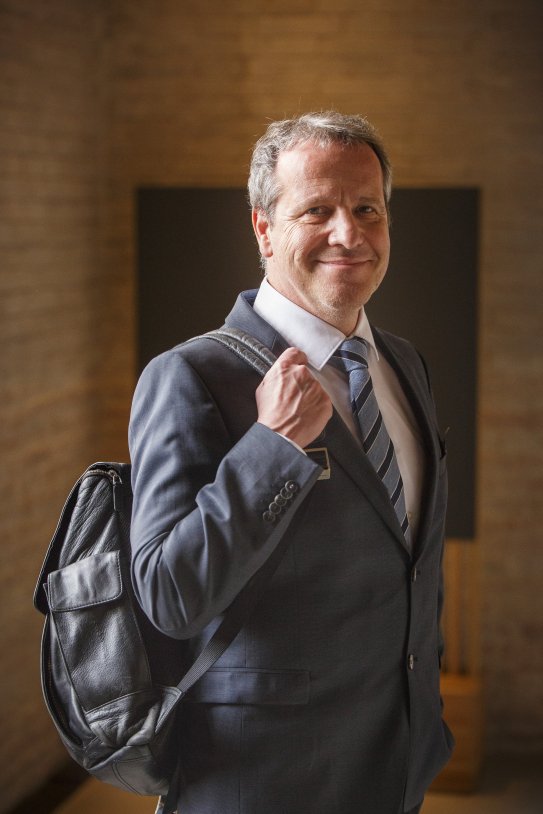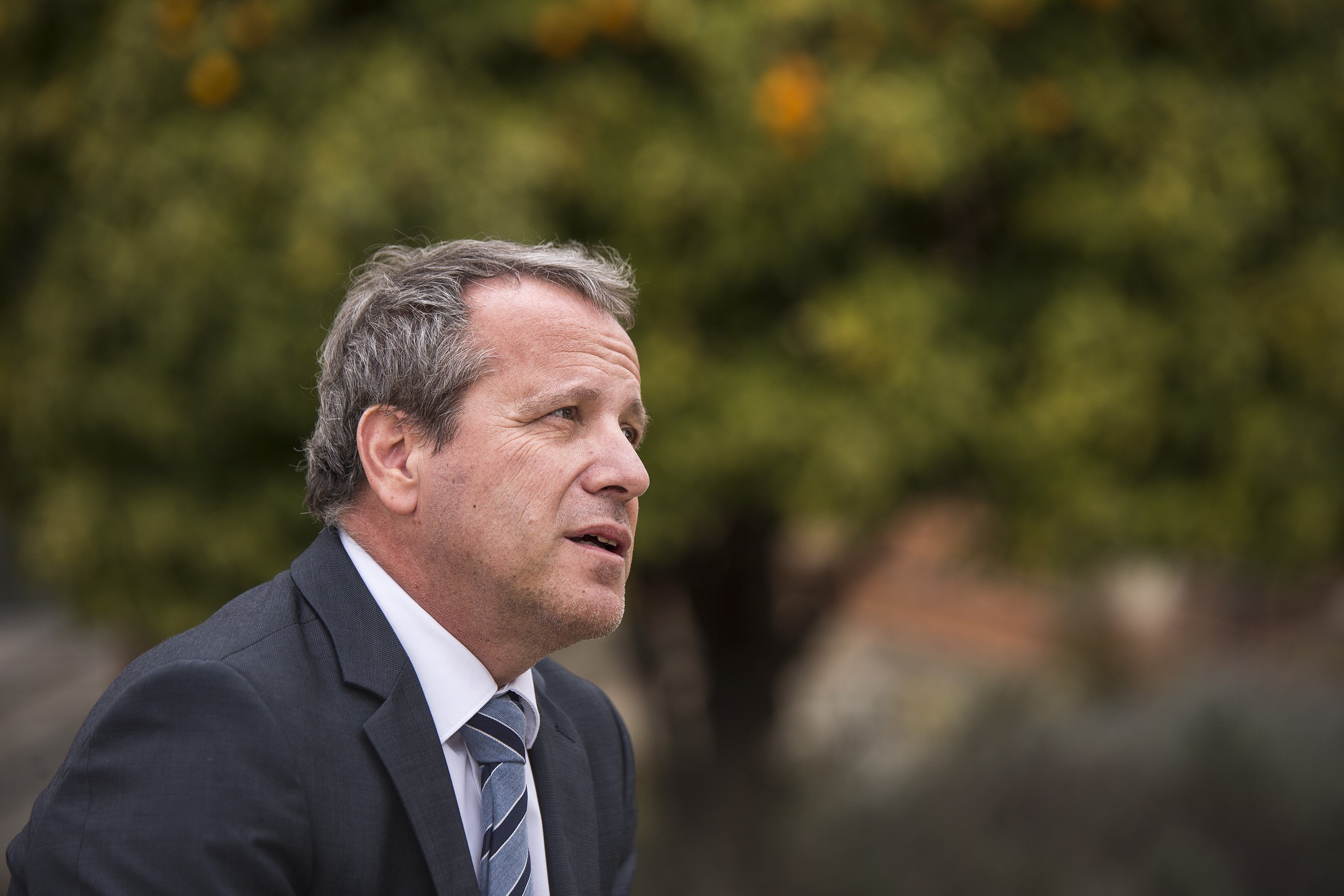Igor Šoltes (Ljubljana, 1964) is a Slovenian MEP in the Greens/European Free Alliance Group. A lawyer and a politician, he joined the European Parliament in 2014 after having been the President of the Slovenian Court of Audit for almost 10 years. Interested in what is happening in Catalonia, he travelled to Barcelona last week to assess the political process and met several Catalan authorities including Foreign Minister Raül Romeva and the Speaker of the Catalan Parliament, Carme Forcadell. In addition, he took advantage of the visit to join the National Pact for the Referendum.
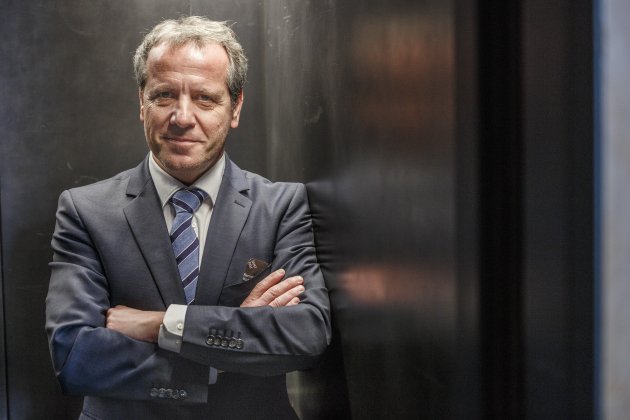
After meeting the Minister, what was your impression of the work the Catalan Government is doing to organise the referendum on independence?
I believe the Catalan Government has a strong desire to do something about this referendum and to give people the opportunity to vote and express their opinion, whether it is to form an independent State or not. That’s democracy, giving the people the opportunity to express their will, and the referendum, the basic instrument to ascertain people’s minds and see what they want or what their prospects are for the future.
How do you see the attitude of the Spanish government against the referendum?
We’re all members of the European Union, and this union is based on very important values. One of them is democracy, and also in many cases solidarity, and as far as possible, egalitarian development. On some occasions, however, it can be that there are regions that stop feeling comfortable living together with the rest of the State. In that case, I think that in the name of democracy it is not bad to let that community express its opinion. It is the Spanish government's duty to respond directly to this.
It's time to sit at the table and talk. With the European Parliament and the international community too
How should it be done?
I think it's time to sit at the table all together and talk. The European Parliament could even play a role, and the international community too. It would be much more appropriate to calm down and have a constructive dialogue, than to do it with threats of sanctions and imprisonment. This is the 21st century.
But the Spanish government refuses to negotiate on the referendum because they claim it goes against the Constitution...
This is an important issue. The Spanish Constitution does not contemplate the right to self-determination. This is very important to me, and that is what I asked the Catalan authorities. For the international community it is crucial to see whether there are any legal obstacles. At this time, I think the main issue is to see whether or not there are legal obstacles to doing so. Secondly, it is also important to sit together and talk, and thirdly, I believe that there must be democratic standards that will allow the citizens to express their will.

Do you think that the Catalan Government should hold the referendum whether or not Madrid allows it?
In the end it will be the decision of the Government of Catalonia. But I really hope that something will have been sorted out by the summer. Not just for both sides here, but also for the international community. I think we will all ask first for the legal basis. I am a lawyer, and I know that sometimes there may be two opinions. I think we should give the specialists in the world of law the opportunity to speak.
But they have already spoken, right? There are several opinions...
Not only those of Catalonia or Spain, we must seek international expertise in order to interpret what the Constitution says. If we could solve this issue it would be much easier. I ask for peaceful conversations in order to discourage the abuse of power and threats of imprisonment and sanctions. Something that will bring a breath of fresh air to the conflict.
The international community is important at this point, true. But the European Union is avoiding giving an opinion on this conflict. Won’t they have to at some point?
On some occasions the European Parliament has spoken very clearly about internal affairs of certain countries, such as Venezuela. It not an easy country because of the extent of external interests there. Even so, it has been talked about very openly, so why shouldn’t we be able to talk about this case too?
The Catalan case should also be the case of the European Parliament. If we talk about human rights and freedom, we must also talk about Catalonia
Yes, and some members of the European Union, like Poland, have also been openly discussed and condemned. But is it possible that there are double standards depending on the country in question?
This is an important issue. We are currently talking about a Europe at different speeds. We could also speak of a Europe with different standards, and with different meanings of democracy, but that would not be right. The Catalan case should also be the case of the European Parliament. If we talk about human rights and freedom, we must also talk about that. It is not something we can put to one side and say that this is not a problem in which we have to express our opinion. It is. We have this duty. We should not be part of the conflict, but we need to give a professional line of reasoning.
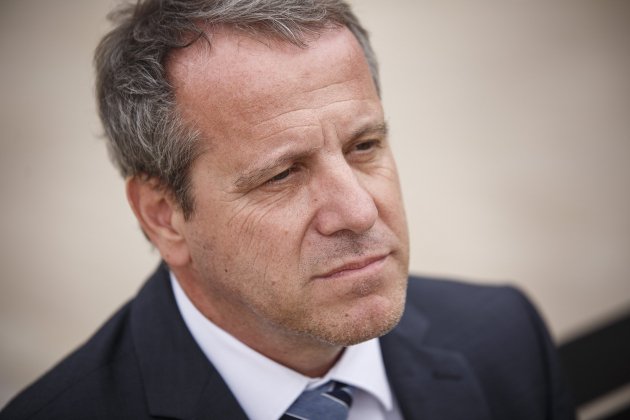
Political judgments are not good for democracy, because they show that with the power and threats you can silence any kind of opposition
The Catalan process has led several political leaders to face trial for allowing a non-binding vote in 2014. Former President Mas has been sentenced to disbarment for two years. What do you think of such trials?
Someone could say that this is a political judgment and has nothing to do with a professional ruling. I believe that we must avoid any political judgment that may give some form of political prosecution. In general, I am very sceptical that someone should be prosecuted for expressing a different opinion from the official one. However, all countries have laws that have rights and obligations, obligations differentiating between what is allowed and what is not. It is not good for European democracy, however, to abandon freedom of expression, even if what is said does not please the authorities.
Some politicians have described this ruling as shameful and undemocratic. Would you agree?
Political judgments are not good for democracy, because they show that with power and threats you can silence any kind of opposition, or any actor that is not in line with your point of view. That’s precisely what democracy is. You have to allow different opinions and allow people to express them. Democracy offers mechanisms to ascertain the will of people, and one of these mechanisms is the referendum.
When I saw Ms Forcadell was on trial, I was shocked. I did not think this could happen here
Legal proceedings have also been brought against the Speaker of the Catalan Parliament, Carme Forcadell, for allowing a debate in the Chamber on this issue...
I was lost for words, I was shocked. I did not think this could happen here. That you could be punished or prosecuted for opening a debate on this issue... I think that’s why we must speak openly and democratically on this issue. Not only here in Spain, but also outside Spain.
Do you think it might be possible to see Catalan politicians in jail because of the referendum?
I can not foresee the future, it is not very diplomatic (he laughs). For me it is very important to try and sit down together and start a democratic dialogue, and not provoke an inaccurate image of Spanish democracy abroad.
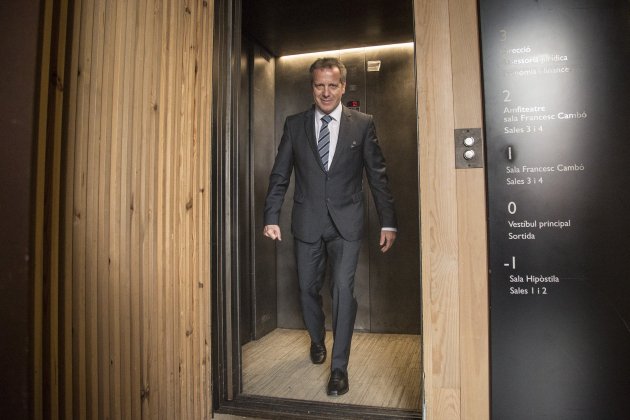
How is this kind of trial seen in Europe?
In Europe there are many very different opinions. I can not speak for everyone. When there is a debate in the European Parliament on the subject, we will see what everyone thinks.
But this debate is not being held in the European Parliament...
Not for the moment, no. But I wouldn’t dismiss it happening in future.
Could it? How?
There are a lot of topics on the agenda at the Plenary in Strasbourg. The referendum is a democratic instrument and therefore I believe it could be dealt with in the European Parliament. Catalan MEPs could make a motion to request a declaration, or use any of the other instruments offered by the European Parliament.
For Catalonia, and also for Spain, what is important is to prepare the legal basis for any action. It is crucial.
Self-determination and referendums are apparently the order of the day again. Not only in Catalonia. Scotland is also pushing for a referendum...
This is an interesting point, because here we talk about the instrument, we talk about the referendum to decide if someone wants to stay or leave. Brexit also used the mechanism of the referendum.
So why not in Catalonia?
Keep in mind that there is an article in the European Constitution that allows it. For Catalonia, and also for Spain, what is important is to prepare the legal basis for any action. It is crucial.
There was also a referendum on independence in Slovenia...
Slovenia was part of Yugoslavia over 20 years ago. I went through this crucial moment in the history of Slovenia. The circumstances, however, were a bit different. In our constitution there was a special article that allowed all Yugoslav republics to announce their independence, in some circumstances, and to pact. However, I understand the situation in Catalonia, and I am sure that we are talking about democracy. There must be freedom of expression, freedom of the press, and there must be the freedom for the citizens to express their will. Democracy is giving people the opportunity to express themselves.
Democracy is giving people the opportunity to express themselves.
Although self-determination in Yugoslavia was permitted, and in the 1991 referendum there was participation and a majority vote in favour of the independence option of over 90%, Yugoslavia responded militarily...
We are not happy about this, nor was the international community happy about the reaction of the Yugoslav army. They attacked Slovenia with tanks and weapons, and then they did the same with other Yugoslav republics, especially in Bosnia and Croatia. It's a very sad story, I hope it never happens anywhere again.
So you believe this could never happen in the case of Spain and Catalonia...
No! (he laughs). We are a long way from that here in Catalonia!
Taking into account your independence process, what advice would you give the Catalan Government?
I have two pieces of advice. The first is to clarify, in the full light of day, the legal basis for this act and convince the international community that this legality exists. The second tip is, if there is a referendum and you gain independence, be careful with it. In some cases, what happens is that after independence, the management and governance of the country shows up its weaknesses. It is very important to prepare the institutions that control public money and be ready for it.
